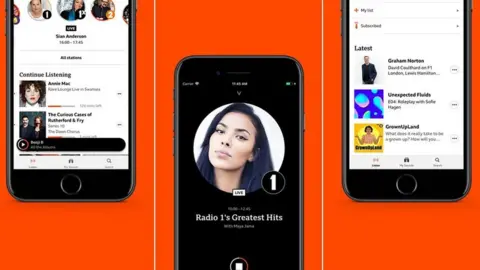BBC building 'public service algorithm'
 BBC
BBCThe BBC wants to "pop your bubble" with unexpected and challenging content on its streaming service, BBC Sounds.
The broadcaster is developing a "public service algorithm" that's "built to surprise you," said the BBC's director of radio and education James Purnell.
His hope is that audiences will stumble onto something new, instead of content that simply reinforces their views.
Algorithms "do not have to create echo chambers," he added, "they can open them up".
Speaking at the Radio Festival in London, Purnell also revealed the BBC had asked rival broadcasters to join the Sounds app.
"Audiences deserve a choice," he said, "so we want to open BBC Sounds up to podcasts made outside of the BBC.
"And we are in discussions about opening the app to commercial radio too."
He did not give a timeframe for adding other stations to the line-up, but said increased personalisation would be available "by the autumn".

Analysis - Amol Rajan, BBC media editor
One of the central claims about media in our time is that we live in echo chambers, sometimes called filter bubbles. The evidence for this is complex, unclear and contested. It may be that we are actually exposed to a more diverse set of views in the digital era than when, say, we only read one newspaper and watched one TV bulletin 30 years ago.
But what is not in dispute is that, as a species, we are outsourcing ever more decision-making to algorithms. Indeed, a theme I have been developing is that we are becoming, to paraphrase Grace Jones, slave to the algorithm. And there does seem to be growing evidence that algorithms, being designed to grasp and retain our attention, pull us in the direction of the controversial, the outrageous, and even the conspiratorial.
An algorithm designed to promote scepticism rather than reinforce prejudice will not have the same commercial appeal as those that make, for instance, YouTube what it is. But, depending on its efficacy, it could potentially have a public benefit: Namely, to replace time-wasting with education.

BBC Sounds launched in November as a replacement for the iPlayer Radio app, offering live and catch-up radio alongside podcasts, playlists and bespoke music mixes.
It has not been universally popular, with users complaining about poor navigation, ineffective search and the failure to display song titles during programmes.
Listeners were also aggrieved when the BBC made some of its most successful podcasts, such as Jane Garvey and Fi Glover's Fortunately, exclusive to the BBC app - withholding them from services like Spotify, iTunes and Overcast for several weeks, apparently to drive users towards Sounds.
Purnell admitted the app had experienced teething troubles, but promised it would "continually improve".
"When we launched Sounds, we knew that we were taking on the biggest businesses in the world, and that we were going to market late," he said.
"We also know that the best way to launch a product is to test and learn from what does and doesn't work - then respond to feedback and change."
He added that the app had already attracted 1.3m weekly users, 84% of whom would recommend Sounds to a friend.

Follow us on Facebook, on Twitter @BBCNewsEnts, or on Instagram at bbcnewsents. If you have a story suggestion email [email protected].
